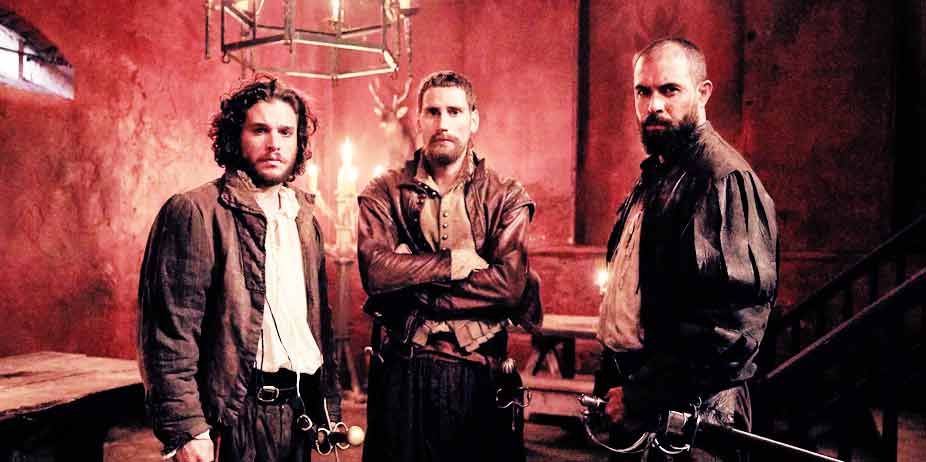
Gunpowder (2017)
Called a 'vanity project,' since the lead actor, Kit Harrington is a direct descendant of his character, Gunpowder is actually an engaging, entertaining miniseries about the Gunpowder Plot, hampered by unnecessarily gruesome violence.
The Catholics of England live under the brutal oppression of a tyrannical Protestant Government, under the influence of King James I (Derek Riddell). After the king's men storm into a private household, scour the premises, arrest, humiliate and press to death a Catholic woman, passionate young Robert Catesby (Kit Harrington) becomes convinced it is time to take a direct stand. Against the advice of his friend Anne Vaux (Liv Tyler), he conspires with Guy Fawkes (Tom Cullen) to blow up Parliament on the day the king and his wife visits, place their child on the throne, and rule through a regency.
Unfortunately for the conspirators, the shrewd Lord Robert Cecil (Mark Gatiss) has his eye on Catesby as a potential troublemaker, and what unfolds through the three episodes is a daring game of cat and mouse that sticks somewhat to history while taking liberties. It's a bold project, to make a film in still Protestant-leaning England that criticizes the Protestant British Government of the 1600s (and the same King James that had the Bible translated), and it suffered poor ratings in the United Kingdom, perhaps as a result. The filmmakers included scenes of harrowing, gruesome violence, so the viewers would understand what drove these men to their terrorist activities, but I don't think that was necessary; the facts are what they are, and it's not hard to imagine an angry minority under oppression choosing violence as their method of communication.
The real shame here is that the women do not have more to do, and that the script is heavy on conspiracy and light on character development; it's hard to remember who anyone is, apart from Catesby. But the opening scene is one of the most powerful, suspense-filled scenes I've witnessed on screen in a long time, and similar events unfold that left me on the edge of my seat. It's hard to make a movie where everyone knows how it ends, and the filmmakers did an excellent job of introducing unexpected plot twists and subplots to keep us engaged, and dreading the end.
The standout performance is Gatiss, who does not flinch away from the deeply unpleasant side of Robert Cecil's nature. He sneers and snarls his way through his scenes, stoic and distant as he asks when the torture victim will wake up "so we can continue." The rest of the cast ranges from quite good to wooden, but the costume design and presentation are immaculate; scenes in and around the Tower of London are eerie and atmospheric, in sharp contrast to the opulence and immorality of the king's court.
One cannot escape the brutality of this period, and I'm glad one priest holds to his beliefs in a realistic way, never condoning violence and remaining firm in his convictions, but it's a case of everyone Catholic being "good" (even if they are terrorists) and everyone Protestant being "bad," so it's a yet another screen-written case of extreme bias, just in the opposite direction from the normal "evil Catholics" of most English period pieces. That being said, I will watch it again... I just wish it had dialed back a little on making me cringe; the violence is nowhere near as extreme as interviews would lead you to believe (it's mostly shocking, because the first scene of it involves brutality toward a woman), but it's also unpleasant.
Sexual Content:
None, but a woman is stripped naked in front of a crowd
(full frontal nudity, seen for several minutes); the
king is openly bisexual (he has men in his room, and one
asks if he wants him there tonight, but he chooses his
wife instead) and often flirts with men.
Language:
Minor profanities.
Violence:
A naked woman is pressed to death (forced to lie down,
then men pile stones on top of her, until it crushes her
-- it's a long, brutal scene); a man is hanged, drawn,
and quartered on screen (hung, cut down before he's
dead, and disemboweled before a crowd); two people are
burned at the stake in Spain; men are pulled on the rack
(graphic, we see / hear them being stretched and
screaming); a man has his fingernails ripped out as a
form of torture; other men are shot and killed; some are
hanged.
Other:
Some artistic license with history, and it deliberately
paints Protestantism in a negative, brutal light.
